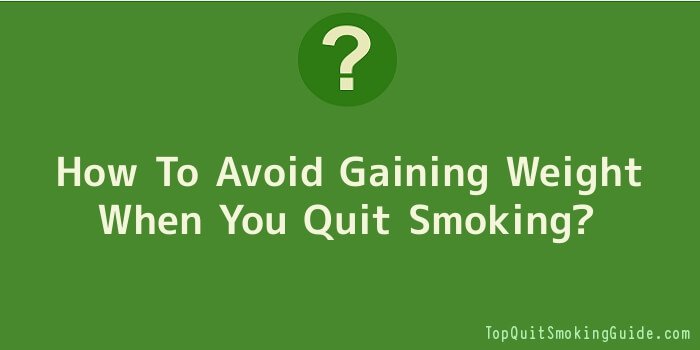
One of the most common excuses smokers use to avoid quitting is the fear of gaining weight. This is a valid fear, because it does seem like many people who quit smoking put on a few pounds (and some put on a lot more than a few!). Why is that? And does it have to happen to everyone who quits smoking?
First, understand that nicotine is a stimulant, and as such it does increase your metabolism a wee bit. Naturally, when you quit smoking and no longer ingest nicotine on a regular basis, your metabolism will slow down slightly. However, when I say “slightly,” I really mean SLIGHTLY. Not enough to make you balloon up to the size of a blimp.
Even better, the effect is temporary and there are simple steps you can take to help keep your weight in balance.
– Make A Plan
Nothing happens without a plan. Write down the steps you need to take to avoid gaining weight after you stop smoking. Having the action items written down in front of you is a powerful reminder of what you need to do to reach your goal.
Once you write the steps down, introduce them slowly. For example, gradually eliminate specific junk foods each week. Add a few fruits and vegetables to your diet each week.
Begin with light exercise and slowly build to include more intense routines. Most people are able to maintain new habits if they adopt them slowly. The same is true for the habits you need to form in order to avoid gaining weight.
– Drink plenty of water.
Smokers are often dehydrated as it is, which makes your body hold tighter to the water it does have. One good way to get your body to release excess water is to drink plenty of water! As contradictory as it may sound, your body will easily let go of retained water when you keep yourself well-hydrated. The general recommendation is 64 ounces per day, and more if you are overweight already.
– Clean up your diet.
The temptation to snack on sweet and salty foods when you quit smoking may be strong, but try to avoid doing so. Instead, lean more toward plenty of fruit and vegetables, lean protein and healthy fats. Instead of chips, try snacking on small amounts of nuts and seeds (because they are so packed with protein and fat, you don’t need more than an ounce or two at a time – way less than the entire bag of chips you would have gobbled). Rather than candy, try some fresh or dried fruit. Also avoid caffeine, alcohol and sugary soda pops.
– Start an exercise regimen.
Check with your doctor first to be sure you can safely withstand physical activity, and then get moving! You’ll probably want to keep it moderate to begin with, like brisk walking or swimming. Don’t be surprised if your lung capacity has greatly diminished if you’ve been smoking for a long time – but it will usually come back the longer you remain a non-smoker and continue to exercise regularly. As you get stronger, gravitate toward more strenuous forms of exercise, like weight training, dancing, or running. The better you feel physically, the less tempted you’ll be to abuse your body with junk food or cigarettes.
– Don’t replace one addiction with another.
Sometimes when people quit smoking they pick up another bad habit to replace it, like eating pounds of chocolate or gulping down those mega-double-whipped-chocolate-caramel-1000-calorie lattes. Your primary objective in quitting smoking is to look and feel better while adopting more healthful habits. Replace cigarettes with carrot or celery sticks, salads, fresh water, and deep breathing. You’ll feel much better than you would by giving in to the temporary buzz lattes and chocolate provide.
– Don’t sweat a few pounds.
If you DO see the scale go up a few notches, don’t let it get you down! Remember that it’s temporary. The more you focus on getting your body healthy and strong, the more quickly those pounds are going to drop back off again. Better yet, don’t even step on the scale while you’re working through the withdrawal from quitting smoking. Who needs the pressure? Instead, keep affirming that you are doing something wonderful for yourself, and you’ll be in much better health in the long run.
